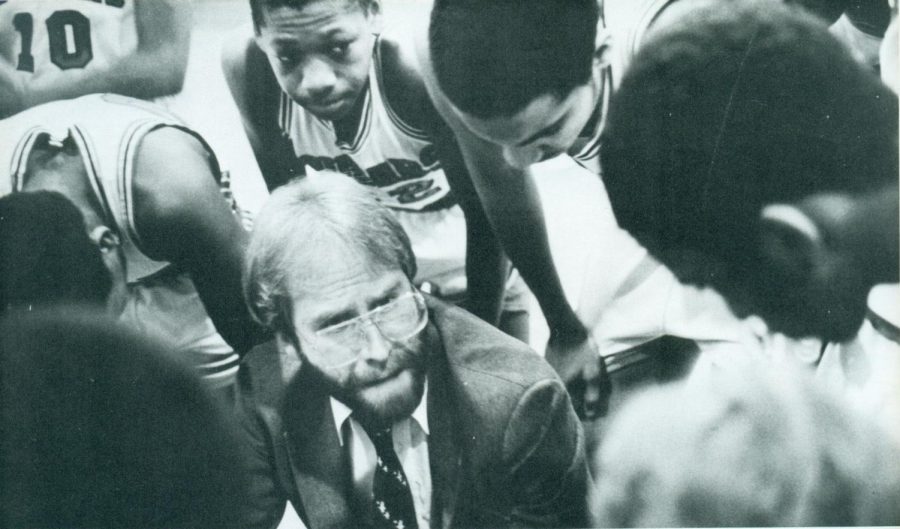Chuck Hess inducted into WF Athletics Hall of Fame
May 3, 2018
After decades of hard work and dedication to the school, Chuck Hess, the former athletic director and coach has been recognized by the school’s athletic Hall of Fame.
Induction is a huge honor and understandably takes lots of consideration. Hess’s achievements as a coach stand out.
Hess started and coached the inaugural boys’ soccer team and led them to a 3A state championship 12 years later in 1996. His soccer teams won nine conference titles and won 72 consecutive conference games, no ties, from 1990-96.
As the boys’ basketball coach, Hess’ first passion, his teams amassed seven conference titles from 1994-2001 and won four sectional championships in the state playoffs.
In 1995 Hess led his basketball team to a regional championship, eventually losing in the state championship game. But it’s for other reasons that Hess, himself, thinks the committee is inducting him.
“I think it might be the longevity of teaching and coaching young adults for 30 years and being loyal to the students and caring about them as an individual,” Hess said. “I was very lucky to be at the right place at the right time to hopefully help and encourage these young people to work hard every day, and to be a better person in life. I sincerely believe that God had something to do with this.”
Hess acknowledges and appreciates the students’ role in helping him into the Hall of Fame.
“It is a tremendous honor and privilege to be recognized by the school and student-athletes. I want to thank all the student-athletes that I was so fortunate to teach and coach because it was them that got me this great honor and induction into the Hall of Fame,” Hess said.
Sports have always been a major role in Hess’s life. At the age of 16, he was on the prep team at Staunton Military Academy in Virginia. Hess was very grateful for this opportunity and learned many lessons about self-discipline and perseverance.
Without the people in Hess’s life who have encouraged and inspired him, he could not have made it to where he is now.
“I had many teachers and coaches in my life that have helped me to overcome my dyslexia. They believed in me and encouraged me to never quit on my dreams and goals. They were a tremendous support and inspiration in my life, along with my wife Gale,” Hess said.
Although, induction is a bitter-sweet moment for Hess.
“It is a very emotional experience for me because my wife and best friend Gale cannot be here to see this Hall of Fame induction happen. Gale passed from triple negative stage four breast cancer on June 5, 2014,” Hess said. “Gale was very supportive of all my student athletes that I coached, and she loved them very much. Gale was a huge part of my life and especially my coaching career. She never missed a game I coached. I miss her so very much.”
Chris Monte worked with Coach Hess on the boys’ JV soccer team. He believed Hess was a talented coach, but his passion to help others is what he admired most.
“Hess has an amazing love for life and a desire to help others. He was a career exceptional programs teacher and worked to help many children with different needs,” Monte said. “Coach Hess believed that all children have potential and deserve support. He truly cared for all of his students and players more than most people will ever understand. His desire to always give something and to help others is probably what I admire most about Coach Hess.”
Hess’ passion for teaching is reflected in his twice making it as a finalist for Wake County Teacher of the Year (1985 and 1995), while his passion for helping others is evident in his being named the United Cerebral Palsy National Volunteer of the Year in 2001 and the Wake County Special Olympics Coach of the Year in 1981.
Geoff Belcher, assistant athletic director and previously the assistant coach to Hess believes that Hess’s ability to transfer skills from basketball to soccer made him a more effective coach.
“I think as a basketball coach he was really great at bringing basketball skills to soccer and teaching the soccer players how to move in the same way basketball players move on the court. I think that made his soccer teams really hard to defend against because it was a little unconventional but also really smart,” Belcher said.
Hess saw practices as an opportunity to not only teach his student athletes about what to expect on the court, but also how to prepare for the challenges they will face off the court.
“I wanted my student-athletes to be the best in everything. I wanted them to be outstanding in the classroom and to be feared by their opponents on the court or playing field,” Hess said. “I loved practice because I could teach and get [their] attention and prepare them to be successful in life. My practices were long and hard, but I wanted [them] to be prepared for all of life’s challenges. Teamwork was and is always paramount!”
Belcher remains impressed by Hess’ practice notes and schedule.
“He kept everything on large note cards. He planned the whole season out. He knew his athletes would have received the instruction they needed to excel when conference and later playoffs rolled around,” Belcher said. “Each pre-season he’d review his cards, and as he got to know that group, he’d tailor practices to their deficits and their strengths. It was amazing.”
To reach your full potential, Hess believes that you can’t just focus on the athletic side. Keeping up in the classroom and having a positive attitude are equally important.
Hess said, “Work hard every day and then some more to be the best you can be in whatever you do. Go to practice every day with enthusiasm. Be the first person to practice and the last one to leave. Practice the basic fundamentals of your sport every day to make yourself the best you can possibly be. Be that student-athlete who is number one in the classroom and the best player on your team. Be a team player, make all your teammates better.”




Jeff • Jun 13, 2020 at 12:45 am
Glad to see that Coach Hess was inducted into the hall of fame. Good coach, but better person and teacher. He greatly impacted countless kids who he coached or taught.